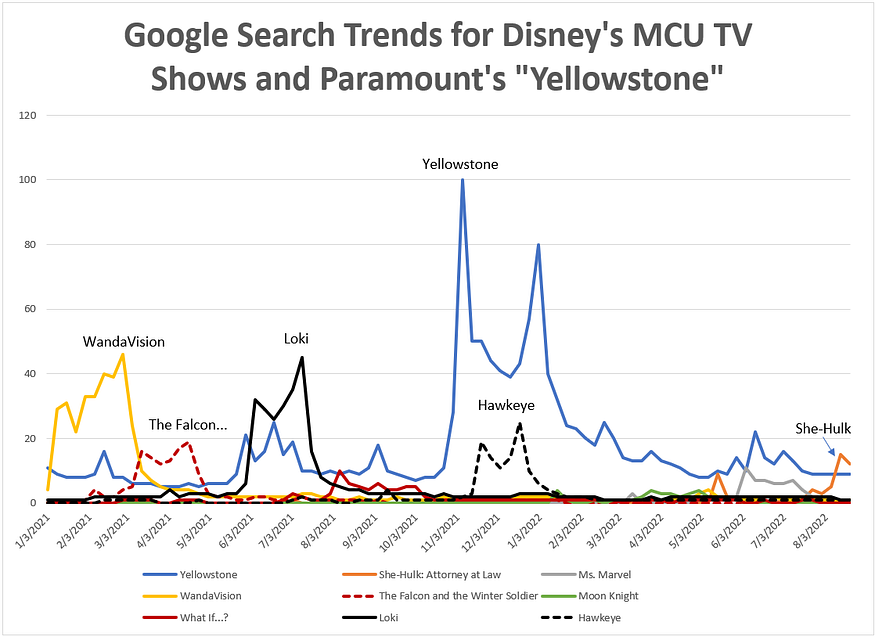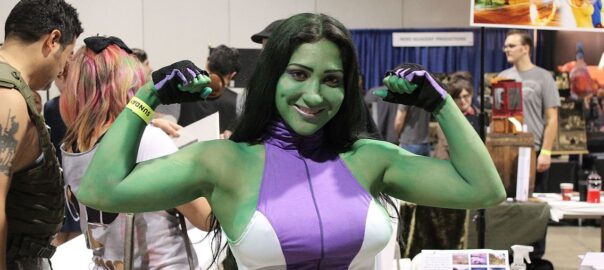By Kent R. Kroeger (Source: NuQum.com, September 1, 2022)
This essay is not a TV or movie review. Personally, I enjoyed the first episode of Disney’s She-Hulk TV series and I’ve been a fan of the She-Hulk character since her Marvel Comics debut in 1980. Instead, this essay is about an objective popularity measure of not just She-Hulk, but all of Disney’s Marvel Cinematic Universe (MCU) TV shows.
I was a comic book fan from the moment I could read (Mad magazine and the original Peanuts paperbacks were most important in that regard). And as I’ve grown older, I’ve met more than a few people (mostly men) with a similar story.
Apart from Mad magazine and Peanuts, my favorite comic book series was Marvel Comics’ The Fantastic Four, featuring Mister Fantastic (He could stretch! It seems like a dumb superpower now, but for a 10-year-old, it was awesome), the Invisible Woman, the Thing, and the Human Torch. From there I would branch into other comic book heroes — X-Men, The Hulk, Daredevil, Superman, Batman, Wonder Woman, Spider-Man and Captain Marvel.
So when the movie version of The Fantastic Four became a reality 17 years ago, I was ecstatic. And though that ensemble was ultimately abandoned (For the love of God, Why?!), the launch of the Iron Man movie series two years later was more than enough to keep me engaged in the first three phases of the MCU movie franchise, culminating in Avengers: Endgame.
Following Endgame, I was satisfied. I didn’t need anymore Marvel superhero movies. But Marvel’s owner, The Walt Disney Company, for obvious monetary reasons, thought otherwise.
Marvel’s creative custodian, Kevin Feige, has ushered in “The Multiverse Saga.” In contrast to the first three Marvel phases, the Multiverse phase includes both movie and TV projects.
I’m not going to address the movie component of the Multiverse — Black Widow, Shang-Chi and the Legend of the Ten Rings, Eternals, Spider-Man: No Way Home, Doctor Strange in the Multiverse of Madness, Thor: Love and Thunder) — as their collective impact on my memory has been minimal. In fact, I have a hard time remembering anything from those six movies except for the joint appearance of the original Spider-Men (Tobey Maguire, Andrew Garfield) with the current Spidey incarnation in Tom Holland.
In many ways, the TV series version of MCU’s Phase 4 has been far more interesting than the movies. WandaVision, as disappointing as its final episode may have been, the show was quirky, funny, and well-acted. That is a recipe for a good TV show.
Which is why the subsequent MCU TV shows have been disappointing and underwhelming.
Again, I’m not doing a TV review, but if we are to understand the data in Figure 1 (below), the quality of the content needs to be considered. According to Rotten Tomatoes (a content ratings service which Hollywood’s powerhouse content providers work hard to manipulate), critics and audiences have loved Disney’s MCU TV shows (the first percentage is based on critics’ ratings and the percentage in parentheses represents audience ratings):
The Falcon and the Winter Soldier — 84% (83%)
Loki — 92% (91%)
Hawkeye — 92% (90%)
What If? — 74% (69%)
Ms. Marvel — 98% (80%)
Moon Knight — 86% (90%)
She-Hulk — 94% (78%)
But do the actual audience measures (Nielsen, etc.) correlate with the Rotten Tomatoes summary of the MCU TV shows?
The short answer is ‘No.’
The TV show with the biggest audience, Paramount’s Yellowstone, has generally positive reviews by both critics and the general public (83% and 84% on Rotten Tomatoes, respectively), but its critical ratings are significantly below Loki, Hawkeye, Ms. Marvel, and She-Hulk.
Yet, which shows actually dominate public interest?
My previous data essays have demonstrated a strong correlation between Google search trends and established audience measures, such as Nielsen’s streaming ratings.
Figure 1 (below) shows the Google Trends search metric for each of the MCU TV shows, plus Paramount’s Yellowstone, which is among the highest rated streaming shows on TV. People actually show an interest in Yellowstone. The same level of interest cannot be said about Disney’s MCU TV shows.
Figure 1: Google Search Trends for Disney’s MCU TV Shows and Paramount’s Yellowstone

Public interest in Paramount’s Yellowstone crushes Disney’s MCU TV shows. That is not debatable. And having worked with Disney executives in a past professional life, I know The Disney Company lives by the Ricky Bobby principle: If you ain’t first, you’re last.
The declining peaks of the MCU TV shows is unmistakable. Audience interest in WandaVision and Loki was relatively strong (46 and 45, respectively, on the Google Trends Index measured relative to Yellowstone’s search frequency), but the decline in interest for subsequent MCU TV shows — Hawkeye and She-Hulk, in particular — cannot be denied.
Hawkeye’s peak Google Trends Index score was 25 and She-Hulk has, so far, peaked at 15.
This is not a pattern Disney wants for its efforts to make MCU’s Phase 4 a major entertainment event. The data says something to the contrary: Disney is failing to generate interest in its MCU Phase 4 TV shows.
I will let others determine why Disney can’t make MCU’s TV shows an unqualified success. Everyone has theories. But the bottom line is that Disney has squandered the incredible success it generated during the first three phases of the MCU.
Though I am still anxiously anticipating the third Guardians of the Galaxy movie, the more I see what Disney has conjured up since Endgame, my expectations for its entertainment value decreases by the day.
- K.R.K.
Send comments to: kroeger98@yahoo.com
